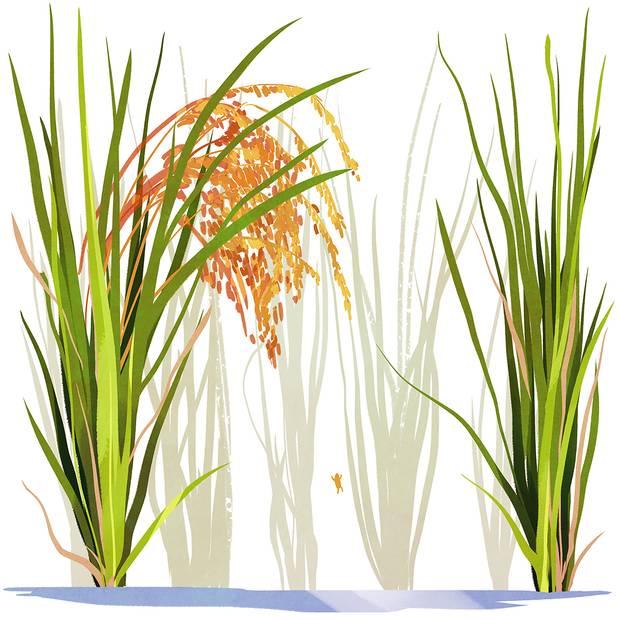Facts & Arguments is a daily personal piece submitted by readers. Have a story to tell? See our guidelines at tgam.ca/essayguide.
Life has this uncanny knack of plonking you at crossroads and forcing you to make choices. Each choice leads to a path unknown and unpredictable. In my case, it led to Canada.
One fateful Saturday in India, 16 winters ago, I received two propositions in the post: an excellent job offer in India and a visa to reside in Canada.
A known devil and an unknown angel! I chose the latter.
Having grown up in South India, I learned about rice transplanting very early in life. Every season, rice seedlings are uprooted and carefully replanted with all the support they need to strike roots again. When I arrived in Canada, I felt like a transplanted rice seedling. Except that I had no support while I was striking roots. Gradually, each layer of what had formed my identity withered while new layers grew.
My "identity crisis" started with my name. I come from a culture where only first names truly matter – akin to royalty. The concept of a family name, or surname, is rather foreign. It is either unknown or rarely used.
Typically, the father's first name is used as the last name, which is then secretly encoded into an initial that is prefixed to the first name – à la P.K. Subban. No, not the hockey star but another P.K. Subban from South India who could go by Purushothaman Kandasamy Subban.
Having to spell out the whole nine yards and witness the agony of my new compatriots trying to pronounce a perfectly phonetic name often made me feel like a stranger to myself.
To make things more confusing, my wife took my first name as her last name, again as per the South Indian custom.
Now, my ancestors had never imagined that one day computers would introduce mandatory fields and formats for names. So, to avoid bugs, I suffixed my real family name to my kids' first names to align them with official standards.
Lo and behold, we all ended up with different last names. Little did I know this would totally flummox the immigration officer at the airport when we arrived. She looked at us suspiciously, then at the documents with our pictures and steadily moved her glare from one to the other. Finally, she growled: "Are you all from the same family?" Though the question seemed a tad irrelevant to me because of my baggage (and here, I mean my spiritual baggage from scriptures that say "the world is one family"). I was happy to confirm with a simple but firm, "Yes."
It is said that a crisis brings out the best in people. In my case, it led to the emergence of a new identity, a Canadian namesake with an abridged first name and a suffixed last name that is not even a family name. The transition from V.L. Srinivasan to Srini Varadarajan broke the ice in wintry Canada and helped kindle warm conversations.
One of my motivations to come to Canada was to leverage my French and English skills. I had heard horror stories of immigrants who had to change their profession, even accept menial jobs despite their high qualifications. My story turned out to be the opposite: I wound up in the same profession I had always practised, despite my lofty ambitions to diversify in Canada.
My journey started with a temp position. But when I showed up at work the first day, my manager thought I had come to work in data entry and my Québécois colleague would be taking the bilingual co-ordinator position. He blushed when he realized it was the other way round. Needless to say, in addition to my name, my vocation also became a great conversation starter. In one interview for a translator position, the recruiter asked, "Please … before my head explodes … do tell me how on Earth you were able to achieve this level in French?"
It didn't stop there. Francophones saw me as an anglophone and anglophones saw me as a francophone. Some thought I was Parisian or Latino. My own community was convinced I was a failure that couldn't make it into IT. In reality, though, I was just this new Canadian with a truncated first name and a suffixed last name who happened to speak several languages. I somehow didn't seem to fit into any culture, yet was acceptable to all cultures – like basmati rice!
Thanks to this passe-partout quality, I have been able to interact freely with people from across Canada and the world. I appreciate their stories, their choice or compulsion to come to Canada, recently or eons ago. I relate to their efforts to safeguard the layers that formed their identity – language, culture, family, friends. And I feel the pain they take to connect the next generation with their roots.
In a sense, they are all namesakes like me who had left a part of themselves "back home." What we did bring with us, though, is a wealth of knowledge and human spirit. The core wisdom that permeates this rich mosaic of cultures is universal and unifying.
We need to leverage this wisdom to foster better connections and spread good thoughts, good words and good deeds around the world.
After all, the world is a large, extended family, right? With or without a family name.
Srini Varadarajan lives in Toronto.
